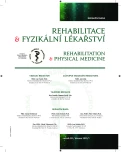-
Medical journals
- Career
Facilitated Expectoration by Airway Clearance Techniques in Patients with Significantly Weakened Respiratory Muscles
Authors: K. Neumannová; J. Zatloukal; M. Šlachtová
Authors‘ workplace: Katedra fyzioterapie, Fakulta tělesné kultury UP, Olomouc vedoucí katedry prof. MUDr. J. Opavský, CSc.
Published in: Rehabil. fyz. Lék., 20, 2013, No. 1, pp. 17-21.
Category: Original Papers
Overview
Ineffective and insufficient expectoration leads to stagnation of bronchial secretion. For that reason, there is a higher risk for pulmonary infection and for other health complications. Cough and expectoration disorders are the most often present in patients with respiratory muscle weakness especially in patients with neuromuscular diseases. Airway clearance techniques should be an important part of pulmonary rehabilitation treatment. When the conventional airway clearance techniques are not sufficient, a mechanical insufflator-exsufflator is important to use. The CoughAssist machine is possible to use for effective expectoration in the Czech Republic.
Keywords:
airway clearance techniques, CoughAssist, neuromuscular diseases
Sources
1. Fauroux, B., Guillemot, N., Aubertin, G., Nathan, N., Labit, A., Clement, A., Lofaso, F.: Physiologic benefits of mechanical insufflation-exsufflation in children with neuromuscular diseases. Chest, roč. 133, 2008, č. 1, s. 161–168.
2. Goncanlves, M. R., Winck, J. C.: Commentary: Exploring the potential of mechanical insufflation and exsufflation. Breathe, roč. 4, 2008, č. 4, s. 326–329.
3. Chatwin, M.: How to use a mechanical insufflator-exsufflator „cough assist machine“. Breathe, roč. 4, 2008, č. 4, s. 321–325.
4. Chatwin, M., Ross, E., Hartm, N., Nickol, A. H., Polkley, M. I., SImonds, A. K.: Cough augmentation with mechanical insufflation/exsufflation in patients with neuromuscular weakness. European Respiratory Journal, roč. 21, 2003, č. 3, s. 502–508.
5. KOBLÍŽEK, V., KOLEK. V.: Anamnéza a fyzikální vyšetření v pneumologii, 2011, s. 19–28. In KOLEK, V., KAŠÁK, V., VAŠÁKOVÁ, M. et al.: Pneumologie, Praha, Maxdorf.
6. Laghi, F, Tobin, M. J.: Disorders of the respiratory muscles. American Journal of Respiratory Critical Care Medicine, roč. 168, 2003, č. 1, s. 10–48.
7. Miske, L. J., Hickey, E. M., Kolb, S. M., Weaver, D. J., Panitch, H. B.: Use of the mechanical in-exsufflator in pediatric patients with neuromuscular disease and impaired cough, Chest, roč. 125, 2004, č. 4, s. 1406–1412.
8. Neumannová, K., Kolek, V., Zatloukal, J., Klimešová, I.: Asthma bronchiale a chronická obstrukční plicní nemoc – možnosti komplexní péče z pohledu fyzioterapeuta – Praha, Mladá fronta, a.s., 2012.
9. PRYOR, J. A., PRASAD, S. A.: Physiotherapy for respiratory and cardiac problems. Edinburgh, Churchill Livingstone, 2002.
10. SMOLÍKOVÁ, L., MÁČEK, M.: Respirační fyzioterapie a plicní rehabilitace. Brno, Národní centrum ošetřovatelství a nelékařských zdravotnických oborů, 2010.
11. Winck, J. C., Goncalves, M. R., Lourenco, C., Viana, P., Almeida, J., Bach, J. R.: Effects of mechanical insufflation-exsufflation on respiratory parameters for patients with chronic airway secretion encumbrance. Chest, roč. 126, 2004, č. 3, s. 774–780.
Labels
Physiotherapist, university degree Rehabilitation Sports medicine
Article was published inRehabilitation & Physical Medicine

2013 Issue 1-
All articles in this issue
- Argumentation for Application of Intentionally Oriented Movements in Physiotherapy
-
Swallowing Disorders In Children - Interdisciplinary Cooperation Physiotherapists with Clinical Speech Pathologist
(Part 1 - Diagnostics) - Facilitated Expectoration by Airway Clearance Techniques in Patients with Significantly Weakened Respiratory Muscles
- Issues of the Locomotor System Injuries Among Golf Players
- Using Dance in Parkinson's Patients Treatment
- Alternative Treatments for Parkinson's Patiens
- Remote Postural Effects Influencing M. Biceps Brachii
- Rehabilitation & Physical Medicine
- Journal archive
- Current issue
- Online only
- About the journal
Most read in this issue- Remote Postural Effects Influencing M. Biceps Brachii
-
Swallowing Disorders In Children - Interdisciplinary Cooperation Physiotherapists with Clinical Speech Pathologist
(Part 1 - Diagnostics) - Facilitated Expectoration by Airway Clearance Techniques in Patients with Significantly Weakened Respiratory Muscles
- Alternative Treatments for Parkinson's Patiens
Login#ADS_BOTTOM_SCRIPTS#Forgotten passwordEnter the email address that you registered with. We will send you instructions on how to set a new password.
- Career

